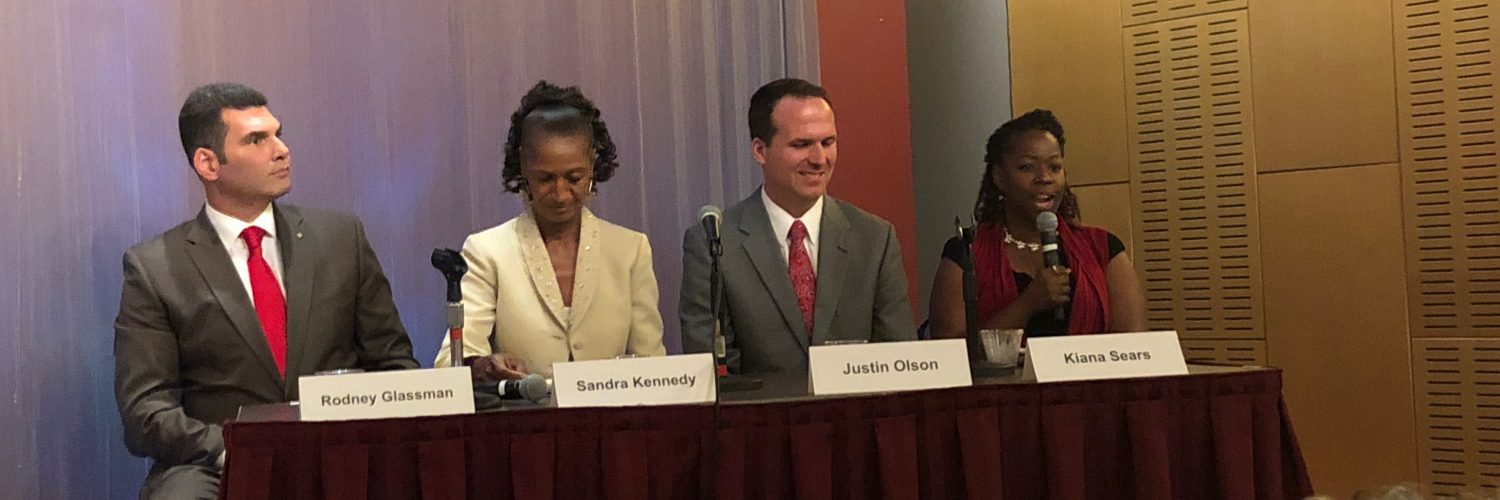The Corporation Commission is one elected body that often goes unnoticed. However, as the so-called fourth branch of Arizona government, those on the commission hold tremendous decision-making power over utility rates and profit-making for utility companies. Elected commissioners play a large role in ensuring Arizonans have access to safe, reliable, and affordable utility service.
There are four people running for two seats on the five-member commission.
The candidates are:
Olson, an incumbent, was appointed to the Corporation Commission in 2017 by Governor Doug Ducey to fill a vacant seat. He says his priority is “to stand up for Arizona taxpayers on the Commission and ensure that their interests are always protected.”
Prior to serving on the Commission, Olson worked as a tax analyst before being elected to the Arizona House of Representatives in 2010.
Kennedy, a former commissioner, served one term on the Corporation Commission from 2008-2012, and was unsuccessful in her bid for reelection. She is running on a platform of promoting solar energy in Arizona and acting as a consumer advocate.
In 1986, Kennedy was elected to the Arizona House of Representatives where she served for six years before moving to the state Senate in 1992.
Glassman is running for Corporation Commission on the platform of restoring integrity to the Commission while promoting clean water and affordable power to help Arizona’s economic future.
Prior to running for commissioner, Glassman served on the Tucson City Council focusing on “jobs, the economy, and public safety.”
Kiana Sears served as the Water & Wastewater Executive Consultant for the Arizona Corporation Commission. She is running because she believes families and small business owners deserve the opportunity to thrive and that children “have a right to breathe clean air and water.”
She says her time at the Commission helped her become an expert in utility operations, analyzing complex data, mainline extension agreements, water and wastewater, telecom, solar, adjudications, and rulemaking procedures.
On Oct. 3, the Arizona State University School of Sustainability held a panel for the candidates to discuss what they would bring to the position.
Here are some highlights:
Question: Governor Ducey signed a bill that provides that, even if voters were to pass Prop. 127, utility [companies] could likely ignore it and pay only small civil fines of $105,000 for non-compliance, basically making it ineffective. If you were elected to the Commission, would you support doing everything within your power, in the Commission’s power, to ensure utilities don’t evade compliance with Prop. 127 because of this new law?
Glassman: As a commissioner, my job would be to follow the Arizona Constitution and to regulate the utilities based on a focus on reliability and resiliency and safety and that includes all the laws that the state Legislature passes because that’s what we have to enforce as commissioners. Every decision that I make is going to be based on reliability, resiliency, safety, and affordability regardless of my personal feelings of what should be advocated and that’s what the job of the commission is, it’s to protect the ratepayers.
Kennedy: I believe the Arizona Legislature and governor overstepped their bounds. The Arizona Corporation Commission has the right to promulgate rules and procedures, and for APS to go to the Legislature and ask [them] to overstep their bounds, is a little farfetched to me. The reason we have the initiative is because the commission has not done what they really should be doing, and that is making Arizona the solar capital of the world. We have rules for renewable energy, we have the renewable energy standard and it has not been updated in years. So, I am supporting 127 and I will do everything in my power, when I’m elected, to make sure that Prop. 127 is actually promulgated correctly into the Commission.
Olson: I think the role of the commissioners is to fulfill our constitutional requirement. Our constitutional requirement, right now, is to establish that the utilities are not charging anything more than a just and a reasonable rate. If Prop. 127 puts new constitutional requirements into the constitution, then it’ll be our job to fulfill those constitutional requirements. We’ve got to then evaluate what is the requirement placed on us both by statute and by the constitution and fulfill the requirements.
Sears: The Corporation Commission is the fourth branch of our government, so when we talk about constitutional right, there has been an obvious attack to actually reach and take power from the Corporation Commission. The governor does not have that power, that right, over the Corporation Commission because it is the fourth branch of government. So, as a Corporation Commissioner, I will defend the position of the Corporation Commission that has been created constitutionally, and do everything in my power to ensure that every dime that needs to be imposed on companies that don’t comply with 127 will be collected because it’s about our safety, our air, our water quality. That’s why I’m here, that’s why I’m in the fight, to actually protect us, the ratepayers and collecting that money would do just that so that’s what I’m going to do for Arizonans.
Q: [Prop. 127] would raise what is currently known as the renewable energy standards, which currently requires 15 percent of power be from renewable by 2025, that was actually adopted in 2006 by the Corporation Commission, not by voters. Which do you think is preferable, for voters to directly set the state’s renewable energy standard or for the Corporation Commission to do that? Why?
Kennedy: It really is the job of the commissioners, but unfortunately, they have done everything they could to roll back renewable energy here in Arizona. They’ve taken away that …. They have decided they’re not going to do anything as far as raising the renewable energy standard, what they have done is made it complicated for those who want to put rooftop solar on and they’ve just made it a business center. So, for prop. 127 and the 80 percent of Arizonans who say “we want this,” kudos to you because the Commission has not done their job.
Olson: I would say that the preferable way to enact renewable energy standards is at the Corporation Commission rather than through a constitutional amendment. There have been a significant amount of solar wars that have taken place at the Commission in the years prior to the time when I was appointed to the Commission. Those solar wars were resolved with a compromise that all of the interested parties have agreed is a good compromise. Rooftop solar is strong and viable here in Arizona, in addition, the Commission has been looking at what are the appropriate renewable standards that the Commission should adopt. We’ve been evaluating that … and what we can expect the cost of storage in the years to come and as that cost of storage drops, then we can increase, dramatically, the renewable energy standards and do it in a commonsense way that doesn’t drive up cost for ratepayers.
Sears: The six and a half years I was at the Corporation Commission, I watched the eroding leadership, that’s why we’re here, that’s why the ballot initiative exists, because of public outcry. I do believe that our commissioners should have stepped up and increased the renewable energy standard as well as the energy efficiency standard a decade ago. I believe in the power of the people.
Glassman: I believe that the appropriate place to set standards in our core branches of government is the state Legislature. If you look at the Corporation Commission, it was created to protect ratepayers and regulate utilities – energy, water, telecom, pipelines – because customers of those utilities, those public service corporations, had no other outlet to make sure they weren’t taken advantage of when it came to rates. If you look at setting standards, that should be happening at the legislative branch and if that’s something that’s not happening, then it would be for advocates to change the Legislature and elect people who are going to do that. I do not believe the Corporation Commission is a place for mandates or advocacy, it’s a place for adjudicating rate cases and protecting ratepayers and keeping rates low in the most efficient way possible.
Q: The Arizona Constitution, Article 15, specifically requires that the Commission prescribes “just and reasonable rates and charges for utilities of the state.” Does this mean the Commission’s sole duty in this area is to keep utility rates as low as possible? Or does protecting ratepayers also mean commissioners also have a duty to consider utilities’ impacts on ratepayers’ health, the environment, or other things that affect ratepayers? If you think that they have both duties, how do we strike the right balance?
Olson: I do agree that the constitutional mandate is our number one priority and our number one requirement, and that is to fulfill that requirement that is in the constitution to regulate the public service corporations, and ensure that they are not charging a rate that is more than a just and reasonable return. Now, in accomplishing that we can, and should, establish mandates that are in the best interest of the ratepayer. If a utility law is something that does not make sense for the ratepayer, then it is appropriate for the Commission to step up and say “look, in this instance, renewable energy, whether it’s solar or wind, is more cost effective and the utility ought to look in that direction because that will establish a rate that is just and reasonable if you invest in something more costly, then it would not.” So, that’s why the Commission has an important role to ensure that the utilities are investing in renewable energy when it makes common sense.
Sears: The Arizona Corporation Commission needs to take a strong stance when it comes to policy. When you look at the fair, reasonable rates, if you go a little farther up and look at the mission of the Corporation Commission, the words clean, abide in the mission, and safety. Clean speaks to me when it comes to health, when reducing our asthma rates. Safety, making sure that our water is clean and lead free and doesn’t have contaminates. I think the responsible role of the Corporation Commission is to protect the ratepayers, not just the dollar amount but our health and our wellbeing. It’s about hardworking Arizonans that need protection against monopolies, it’s not about companies’ special interests. It’s about us, who live here, work here, play here and our environment needs to be protected and so do the rates.
Glassman: The role of the Commission is to protect ratepayers when it comes to affordability, reliability, resiliency, and safety. That’s the jobs of the Corporation Commission. Now I have a track record when it comes to sustainability, when I was in law school, I ran for the Tucson City Council. A role where I was able to create mandates, I wrote the nation’s first mandatory rain water harvesting ordinance for commercial developments, the first gray water plumbing ordinance for new homes, and the first solar water power heating plumbing ordinance for new homes. I did that as a member of the council because that was the role of the elected body that I ran for and was elected to. The Corporation Commission, within the Arizona Constitution, is very different. If you think about it, why was it created as the fourth branch of government? It wasn’t to do things the Legislature could do tomorrow, it was to protect ratepayers when it comes to the regulated utilities, making sure they weren’t being taken advantage of and were paying fair rates.
Kennedy: Back in territorial days, the Commission was formed to protect the consumer. History has shown that [the] Commission has sided with the monopolies and not with the ratepayers and that is an issue we are seeing today. It is time for a change when it comes to individuals representing the mere people they are elected to represent. It is a public service commission, not a monopoly service commission. When it comes to the environment, one of the things the Commission does have charge to do, and staff does it very well, they get information. When it comes to the environment, I think the commission and DEQ should work hand-in-hand.
For more information about the Corporation Commission seat click here. The election will be held on November 6, 2018. To register to vote, click here; and to find your polling location, click here.
















Add comment